
Close-up of tender young flower bud.
(*photo by Sally Ramsdell)
July 6, 2010
Announce that America's Renewables Are Here Now
Renewable energy has proven itself to be a solid investment --
growing rapidly and nipping at the heels of the stagnant nuclear
power.
Ken Bossong, Executive Director of SUN DAY
The
traditional energy companies would like to have us embrace the
message that renewables are in the distance, and their message is
that practicality calls for reaffirming past practices: "dig, baby,
dig;" "drill, baby, drill;" "insure the new nukes." In order to
get some sort of legislative bipartisanship the exploitation of oil
and coal is in fashion -- but ought it after the Deepwater
Horizon and the West Virginia coal disasters? For a number of
years the Sun Day Campaign has reminded us of renewable's potential
without unsustainable reliance on coal and oil.
Renewables
are here, not coming. The final 2009 records from the U.S.
Energy Information Administration (EIA) show that U.S. renewable
energy sources increased from 9.44% in 2007 to 10.10% in 2008 to
10.66% of the total energy consumption in 2009. Thus the renewable
field (biofuels, biomass, geothermal, solar, wind and hydropower)
provided 7,833 quadrillion Btus in 2009. This is a 5.5% increase
over the previous year and 15.8% over two years before.
Unfortunately, much of the increase (51% total energy) is in
biofuels, a sizeable portion of which are derived from corn that
could be used for global food stocks. Hydropower is at 34.2%, wind
at 8.9%, geothermal at 4.7% and solar at 1.2% of the total renewable
picture right now.
Traditional
sources are sinking, not being maintained. Smaller renewable
sources have very high development potential -- provided that this
country adopts an option for renewable buildup. Placing limited
financial resources in off-shore drilling, "clean coal," and loans
to new, expensive, and still insecure nuclear powerplants is
wrongheaded. Total renewables now almost equal nuclear (11.33% of
total energy) and the nuclear total percentage has declined for the
past two years -- 1.2% from the 2008 level and 1.5% from 2007 level.
Wind power is
expanding, not limping along. In 2009, hydropower provided
6.89% of U.S.-generated electricity and the other renewables
contributed 3.57%; the combined total of renewables was 10.46% of
total. In 2009 non-hydro renewables grew by 11.81% over 2008
and 34.09% over 2007 with wind now accounting for over half (50.14%)
of the electrical generation from non-hydro renewable energy
sources; other sources were biomass (38.50%), geothermal (10.78%)
and solar (0.58%). Wind is the fastest growing energy source
in America today and it ought to be receiving a major share of
national energy financial resources. It is safe; it is
plentiful in much of America; it is rapidly becoming cheaper than
nuclear power; and it can be brought on line quickly. Source:
www.eia.doc.gov/emeu/mer/overview.html
Prayer:
Lord, help us to renew our ways through renewables.
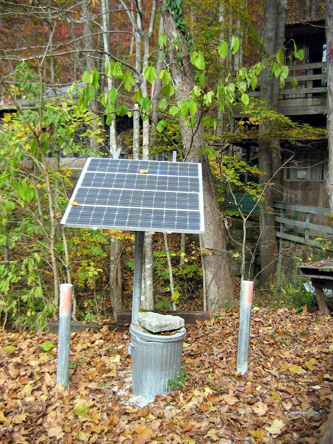
Solar panel at the Mary E. Fritsch
Nature Center, ASPI.
(*photo credit)
July 7, 2010
Consider Solar Photovoltaics
Monday's review
of renewable energy advances makes us acutely aware that solar
energy is last on the renewable list, and yet it could contribute
significantly to a future national energy mix. The International
Energy Agency predicts that solar will go from 0.5% of current world
supply to 2.3% of world's power by 2020 and 8.8% by 2030. By the
agency's estimates photovoltaics and concentrated solar power could
provide 11% of electricity by 2050.
For
decades, photovoltaic "solar cells" have been known to generate
electricity directly when exposed to sunlight. The first generation
of solar units were a single-crystal silicon variety. The second
and later generations will be chemical coatings, which cost far less
and are more versatile. Coatings and roofing tiles have been
developed, which can be applied directly on new construction or
retrofitted on existing buildings. In recent years we have observed
shiny multi-colored arrays of silicon cells on roofs of buildings.
Solar-produced electricity reduces the need for fossil-fueled
powerplants and all the accompanying pollution and land disturbance
in extracting the fuel. Useful energy can be generated on location,
and stored in batteries for nights and rainy days. This saves
energy transmission losses and expanded lines.
For years the
federal government's Million Solar Roof Program recognized
that this energy delivery system need not be a major technological
monopoly for power generators alone. Smaller decentralized
efficient solar units are possible with proven solar technology. It
is just that the devices are still expensive due to lack of mass
production and tax incentives. These solar systems light homes,
roads and paths, power appliances, charge solar electric cars,
operate traffic signals (especially in remote places), pump water,
and run ventilation fans.
In July, when
the sun shines down upon us, the heat loads cause air conditioners
to work overtime. However, this means that the fossil-fueled
powerplants are often working at peak capacity risking rolling
brownouts or blackouts. That is precisely when solar energy makes
its maximum contribution to the utility mix of fuel sources. All
the while, any solar application makes us aware that we need to
conserve our resources even when they are directly from the sun --
for equipment is costly and application comes at a cost of effort.
On these days, solar-powered photovoltaics generate plentiful energy
to feed back into the system. This is why we need to expand
integrated utility systems with "net metering" for solar systems.
Your solar home system will not only have enough energy for local
demands, but will run your meter in reverse when having a surplus.
Utilities prefer to buy this back at wholesale rather than retail
rates, and so some adjustment is being made by state utility
commissions to help reach a fair return for all parties.
Prayer:
Lord, encourage us to support solar sources of energy for, like
water, light is essential for our wellbeing and life.
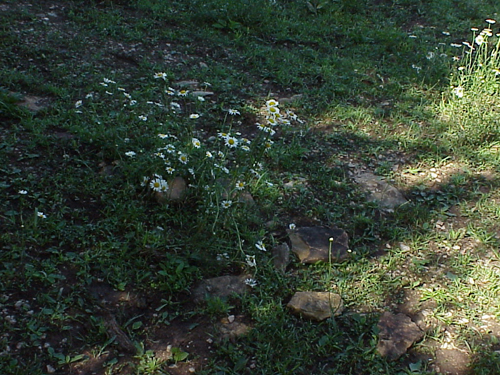
Daisies and stone.
(*photo by Sally Ramsdell)
July 8, 2010
Confront Wage Theft As a Global Problem
A
little while back, someone came and told me that he had worked as an
associate for a private contractor who kept promising to pay for the
time spent subbing -- but he never did beyond an introductory fee.
When it came time for payment, the person kept putting this trusting
soul off and off and off, all the while extracting more and more
labor from him. The owed money mounted into the thousands of
dollars, before the victim realized he was dealing with a clever
thief. The parties had no written agreement and so there was little
legal ground on which to force "blood from a turnip" who had already
spent the victim's wages.
Only
when I read "Faith Works," the newsletter of Interfaith Worker
Justice, did I realize that what I regarded as an isolated
instance perpetrated on timid people too embarrassed to complain, is
a practice that is widespread. The theft occurs both in large and
small operations, both in this country and abroad. This appears to
be a common practice in China where workers are often denied wages
for a variety of excuses. Furthermore, this is more than an
American and Chinese phenomenon; it is global. People work and then
they are given a small return or are denied any reimbursement for
time spent. The injustice is so utterly cruel because it becomes
the profit for those powerful enough to get away with it, and
encourages a crime wave that no one talks about -- and that victims
are too powerless to confront successfully.
Last
November 19th there was a National Day of Action to Stop Wage
Theft in forty locations throughout the United States. Among
the many injustices exposed was that of four Polish workers in
Chicago, each owed over $10,000 from a single contractor. Some say
that the lack of regulations and legal means to prosecute
infringements on wage payments allows some to extract sizeable
amounts of service from temporary workers -- and then move on to
selecting others within a massive unemployed labor force.
The
U.S. Labor Department's Wage and Hour Division is cracking down on
wage thieves and is focusing on protecting the rights of workers to
their earned wages. In fact, the Secretary of Labor, Hilda Solis,
states that the agency is hiring hundreds of new investigators and
making aggressive efforts to combat wage theft. Maybe these worker
rights ought to be coupled with the right of ALL the unemployed to
regard our government as the employer of last resort, something we
have long sought. For further information, please check out
Interfaith Worker Justice in Chicago or on the Internet at the website
www.iwj.org.
You may want to purchase "A Worker Justice Reader" published this
year by Orbis Books.
Prayer:
Lord, help us to stand up for workers who deserve a just return for
their labors, and to expose those who steal the just wages from
those honest victims who deserve the daily bread for their
families.
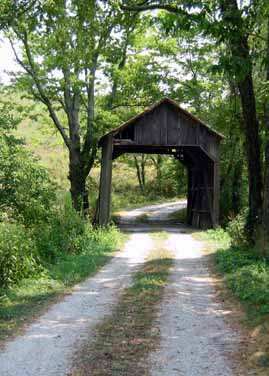
Valley Pike covered bridge, Mason
Co., KY.
(*photo credit)
July 9, 2010
Travel the Local Back Roads Occasionally
I take off some time and hike the hills behind my house on the
macadamized public roads that are near Cottage Furnace and the other
sites within the Daniel Boone National Forest. Some prefer more
challenging back country hiking trails, but for those who need
modified local hiking the back roads prove satisfactory enough. Are
you bogged down by summer heat? At least plan the occasional hike
during a cooler part of the day.
Hikers
like to tell their own experiences. Jonathan Kandell (Smithsonian,
May, 2010, pp. 52-59) describes traversing 216 miles of Vermont
Route 100 by vehicle, and includes in the article some wonderful
photographs that make a delightful virtual trip for readers. For
hikers on foot, Kandell describes the parallel 160-mile "Long
Trail," which merges with the Appalachian Trail in southern Vermont.
People
within the U.S. Department of Transportation are seriously
introducing the concept of constructing national biking and hiking
networks. On a smaller scale these networks would be similar to the
Eisenhower era national Interstate Highway System. No wonder today
90% of all travel to work is done by automobile. Had the same
effort been made for public rail and high speed transport, the auto
culture would not have been so overwhelming. No one is permitted to
walk along, bike along or hitchhike on the sacrosanct Interstates.
Fairness is long due, and biking and hiking networks are possible at
far lower costs than the current road system.
Making
these hiking/biking networks happen may take additional time and
effort -- and the lobby resources are far more scarce. In the
meanwhile, let us use the back roads for both shorter-ranging bike
trips and hikes -- even though speeding vehicles on these routes can
be dangerous. With that extra care one can cite a number of
advantages of choosing local routes:
* Smaller
carbon footprint by not having to travel great distances to get to
the starting points;
* Ease at
getting or keeping connected to relatives and friends, if hiking or
biking locally;
* A lesson in
geography, history and local culture;
* Opportunity
to keep tourist dollars in the local area; and
* Less stress
on travelers who are in familiar areas.
Some
oppose this "stay at home" attitude and promote the benefits to
longer distance travel: increased knowledge about the world;
talking points about adventures elsewhere; and the chance to get far
away from business as usual for a period of time. Such are true but
ought such travel be done only on very rare occasions?
Prayer:
Lord, teach us to love our local environment, but how can we do this
without immersing ourselves in the vicinity to every degree
possible?

Geode toll structure, Route 68, near Shaker
Village of Pleasant Hill, KY.
(*photo credit)
July 10, 2010
Try Route 68: The Main Street of Kentucky
Somewhere
between meandering travel on America's local back roads (as
mentioned in yesterday's reflection) and travel at high speeds on
the Interstate is traveling by private vehicle on the medium-sized
highways or the U.S. Highway (not Interstate) System -- the
principal mode of auto travel a half century ago. These "U.S."
numbered routes networked the entire lower 48 states when only 48
existed; their major cross-country routes often ran parallel to the
newer U.S. Interstate System. However, the non-parallel routes have
some very pleasant surprises for travelers.
This
middle routing is possible on such routes as U.S. Highway 68 (see
Daily Reflections for September 30, 2008, on Road Safety). No
doubt I am partial to this route having traveled on it to school for
twelve years. Route 68 was formerly a buffalo trace, the gullies of
which are still apparent; the animals migrated each year to the
salt-rich Blue Licks area. The route was later used for centuries
by Indian hunting parties. Later still, the route became the
"Maysville Pike" (first called Zanes Trace) that competed
with the Wilderness Trail through Cumberland Gap in bringing pioneer
settlers westward. In fact, during school days we passed a road
marker installed in the 1830s with mileage to Zanesville, Ohio,
listed as the northern end and that to Florence, Alabama as the
southern terminus. In fact, this route became the focal point of
Andrew Jackson's veto of the "Maysville Road Bill" with which
political scientists are familiar. The route used tollgates until
the 1890s; I remember grandpa speaking of driving cattle down that
toll road as a farm boy.
Some call Route
68 the "Main Street of the Midwest." Along this route is old
Washington, the first town so named, with many quaint features (see
Ecotourism in Appalachia). The highway travels past Blue
Licks Battlefield (last battle of the Revolutionary War), through
scenic Paris, and through the heart of historic Lexington, though
quiet beauty has been sacrificed by broadening the highway due to
mounting traffic congestion.
Past
Lexington the "Harrodsburg Pike" descends into and rises from the
Kentucky River gorge with its own charm, and then it runs past
Shakertown, a major tourist attraction. Route 68 trisects the heart
of Kentucky and passes Lebanon and Campbellsville allowing short
side excursions to Gethsemane Monastery at New Haven, Lincoln's
birthplace at Hodgenville, and the Mammoth Cave National Park near
Bowling Green. The highway itself moves on through Russellville and
past the birthplace of Jefferson Davis at Fairview; then it
traverses the Land Between the Lakes in western Kentucky and then on
to Paducah on the Ohio River. If you travel the highway as a
sightseer, you are on "main street." It is a good relaxing summer
vacation diversion.
Prayer:
Lord, allow us to relax by traveling and sightseeing through
significant local places, and to do so to be nice to our limited
energy and to be increasingly "green" at the same time.

Tall thimbleweed,
Anemone virginiana.
(*photo credit)
July 11, 2010
Reflect on Being Good Samaritans And who
is my neighbor? (Luke 10: 29-37)
Global Internet
makes a global neighborhood. This year's earthquakes in Haiti,
Chile, Indonesia, and Mexico shake and harm victims and shake those
of us on firmer ground as well. We hear the lawyer ask Jesus a
searching question about commandments, after showing himself to be
well versed in the law; the lawyer uses Deuteronomy 6:4-7 (loving
God above all) and Leviticus 19:18 (loving our neighbor as
ourselves). We ask that question as well: who is our neighbor? We
may be prone to become like the passersby and overlook foreigners,
drunks, distant people. However, we think of Haiti and realize that
a neighbor is not only one in the locality; neighbors are those we
hear about anywhere on this planet. Modern communication networks
(Internet and television) allow them to come easily into our hearing
and viewing zones.
The
good Samaritan confronts a critical situation head-on. Jesus tells
the inquiring lawyer about a victim who is waylaid and neglected by
the passing priest and Levite and then assisted by a Samaritan who,
although part of a despised sect, gives attention, binds up wounds,
and takes the victim to an inn. A "neighbor" does not hate or show
bias or pre-judge another; a neighbor does not seek the causes of
the accident, whether the robbers are still present, or whether he
will be made unclean if the victim touches him in any way. A
neighbor gets involved, and this attending takes time, ingenuity,
and resources (bringing to an inn and paying for the upkeep).
Samaritans "suffer with" and show compassion.
Parables apply to
individuals and to communities. Americans are often richly endowed
but are tempted to deny victims' situations such as world hunger or
disease; we are tempted to excuse ourselves from our share
in global climate change; we distance ourselves (escape) from
unpleasant situations by busying ourselves with unnecessary tasks
and allurements. Our affluence tends to desensitize us to
disturbing global conditions. Rather than radically sharing with
those terrorized by not having food for this coming meal, we look
into other problems and turn our corn into biofuel for joy-riding.
We tend to forget that a world of 850 million hungry that was
supposed to be halved in this decade has grown to 1,050 million
hungry people.
Have
we forgotten that attaining our own salvation involves seeing,
coming to, and assisting the needy? Can we any longer tolerate
excesses and luxuries when others lack necessities? The Good
Samaritan makes us painfully aware of how our omissions (by
ignoring, excusing, or denying passersby) damage the concept of
global neighborhood. Active concern trumps blatant disregard for
victims. Jesus' words in St. Matthew's Gospel (Chapter 25) haunt
us: For I was hungry and you never gave me food.
Prayer:
Lord, teach us to see those in need and to know when to go out to
others and become involved in their situations.
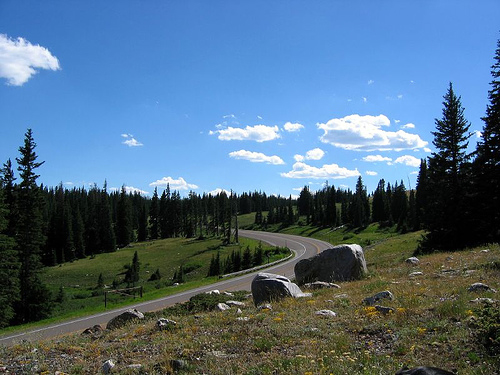
A winding road through Medicine Bow
National Forest, Wyoming.
(*photo credit)
July 12,
2010 Make July a Good Retreat Time
We
each need reasons for an annual retreat. July reasons may be used
in other months in creative ways as well.
*
July is new beginnings, for it is the start up of the
financial and budget year for many groups with which we are
associated. It is the ideal time to take stock; or, for those of us
on a January startup, to prepare for the rest of the year.
*
July is dog days, a time to lay off excess physical activity,
and stay in the shade -- a good time for retreating.
*
July is daylight month in the Northern Hemisphere (along with
June). This is the time to experience in visual form the many
vistas of God's creation from early morning to late evening.
*
July is "down time" or vacation and thus one is less
concerned about being contacted by associates to assist with one or
other project. The rest of the world in the northern temperate zone
calls this vacation time and so less work is expected.
*
July is children's time for parents, for vacation time is the
opportunity to bond.
*
July is freedom, for we do not need those excessive cooler-
climate, restrictive clothes. We can relax and get into informal
gear, a better way to consider our stance before God who is all
merciful and willing to see us as we are.
*
This is wildlife quiet zone, but a good period to observe
animals and come closer to them. Somehow many animals know they are
being enjoyed by non-threatening admirers.
* July is
outdoor season, at least most of the time. Weather allows for
outdoor exercise and movement while reflecting. The great outdoors
in full leafy "raiment" conveys a sense of productivity and future
fulfillment.
*
July is nature's fruitful period -- when a host of berries
and natural products can be harvested directly in the wild and
without the processing that ruins tastes and complicates the eating
process through overuse of sugar, salt and fat. What better time to
turn our minds more to the Creator of all good gifts?
*
July is my retreat time -- the best reason. For committed
retreat centers, any time is good for retreatants, for their goals
are to keep beds warm and staff working. Full occupancy means
success for the retreat-giving enterprise with the hope that
potential retreatants will like different seasons. Ideally, for the
person reserving space, quality time is what is important, not just
exactly "when" it occurs.
Prayer
-- Lord, move us to decide when it is best to retreat.

Reflections of a summer sky.
(*photo credit)
July 13, 2010
Thank God for July's Blessings
July is nearing the heart
of the growing season and there are many things to be thankful for in years of
plentiful sun and rain.
We sometimes forget that beyond
the discomfort of heat in mid-day is a world of goodness that is worth a morning
or evening reflection. Thus this small list is a few of many gifts --
* For juicy fruits of
mid-summer such as peaches, plums and cantaloupes.
* For farmers markets and
people willing to take the time to give each of us gardening hints to improve
our own skills.
* For picnics and
holidays and the enjoyment these bring.
* For patriotism in its
most proper form of balanced civic pride and criticism where that is due.
* For summer garden
veggies such as early cucumbers, tomatoes, early corn, squash, beans, beets,
early potatoes, and late peas.
* For a good sense of
balance that allows us to stay indoors in hot hours and to move about in the
cooler portions of the day.
* For the long days of
sunlight that allow for less stress in morning and evening driving.
* For the peacemakers who
constantly remind us that we could have a more perfect world, if we spend more
time on authentic development and less on military exercises.
* For rest time in
whatever way we are free to exercise it during days, weeks or even the annual
vacation.
* For wild blackberries,
blueberries, dewberries, wineberries, raspberries, and a multitude of other
berries with local and wider-known names.
* For caring friends who
see when stresses become too great for us and are willing to help in gentle
ways.
* For good literature
that has been saved through the year for this July reading period.
* For those who remain
enthusiastic even through July, especially youth at the seashore and elders in
conversation.
* For Mountain Moments,
a blessing in a thousand ways.
Prayer: Lord help
us endure the heat of July and still keep a smile on our faces.

Nature's bouquet on the grounds of Pere
Marquette Mission Memorial.
(*photo credit)
July 14, 2010 Entitle
Jacques Marquette "Premier Franco-American"
On this Bastille Day
those of us of French ancestry seek persons who stand out the most in
exemplifying our close connection to the "Old Country" and France's very special
relationship to our continent. Hopefully, later this year we will see published
a little book entitled Water Sounds: Reminiscences of North American Jesuit
Missionary/Naturalist, Jacques Marquette (Marquette University Press). See
June Fourth, "How Many Sounds of Water Can You Distinguish?" Perhaps the
candidacy of Pere Marquette as the "premier Franco-American" is most fitting;
this is certainly not because as a Frenchman he liked wine or fine foods, for he
lived a spartan life. Rather he was a --
* Missionary/Pastor
-- He literally gave his whole self and even his life for his people and
ministry; he took great pride in his work and worked diligently even against
great odds for his people;
* Explorer -- He
was the associate on the Mississippi River Expedition, and it was his materials
that became the basis of knowledge about the watershed (especially after
Joliet's spill and near drowning as he and a companion approached Montreal);
* Linguist -- His
ministry was to a wide array of early Native American tribes, and he devoted his
linguistic skills to learning their languages for purposes of communication;
* Continental
map-maker -- He created some of the first maps of the Great Lakes Region,
which incorporated his knowledge of parts of what is now Canada as well as the
United States;
* Naturalist --
Marquette's description of certain fish, birds and mammals shows his keen sense
of observation and skill in recording (he was the first to describe the tidal
changes in the Great Lakes and his hydrology was essentially correct);
* Faithful citizen
-- He loved his French cultural background, his king, and the impact that his
spreading what is French had on its budding empire. He was to live before the
United States came into existence, but three of his family would come to these
shores and fight (and two die) for America in the Revolutionary War;
* Humble worker
-- Marquette was not really recognized in his own lifetime and seemed to have
been overlooked in some of the important events in New France; however this did
not bother him. God's power made Marquette known after his death; and
* Lone Witness --
He is the icon of all French service in North America and is buried alone in a
travel center of the Great Lakes region at the Straits of Mackinac.
Prayer: Lord help
us to spread the Good News about the work of your faithful servant,
Jacques Marquette.

Enjoying a July field.
(*photo credit)
July 15, 2010
Realize Drug Ubiquity
They are everywhere;
they are in the home, in the school, in the work place and in the recreation
areas. Yes, drugs have found their way into all parts of our land -- and they
are even finding their way into our waterways as well. Through the testing of
our water some indications can be found as to sources. Thus the nature of rural
drug problems, which have long been suspected, can now be quantified to some
degree. Many regard drugs as an urban problem and often rural areas have been
overlooked; yet meth and prescription opiates are a major problem in rural
Appalachia.
Americans today are using
many manufactured drugs (legal or otherwise) in sizeable amounts -- and some of
these are spilled or pass unaltered through our water purification systems.
Drugs remain after water purification; male fish become pregnant; people are
getting ill from water pollution; estrogens affect the unsuspecting. It only
takes minute doses to affect a variety of creatures. Standard testing methods
used by drug epidemiologists have been biased in favor of urban areas. The
"DAWN Program" monitors drug-related visits to hospital emergency rooms and
drug-related deaths reported (or underreported) by medical examiners; a second
method is a voluntary survey and urinalysis of arrestees. Both methods give
greater significance to urban America.
One novel approach is to
measure society's drug use by analyzing sewage. A recent Oregon study tested
untreated wastewater for three drugs (a metabolite of Cocaine, Meth and Ecstasy)
in order to spatially map drug prevalence. The drug "index load data" provided
information for all people in the community and are potentially applicable to a
much larger proportion of the total population than existing methods.
Reference: CJ Banta-Green et al.,"The spatial epidemiology of cocaine,
methamphetamine and 3,4-methylenedioxymethamphetamine (MDMA) use: a
demonstration using a population measure of community drug load derived from
municipal wastewater," Addiction, Nov. 2009 104(11):1874-80.
No current general water
analysis can trace the particular drug back to individuals or to certain races
or genders or age groups. Critics state that using such analyses to cast
suspicion on individuals within communities would be a poor application of
information. A proper conclusion of the cited study is that drug use is quite
widespread. "So it's really up to everyone to engage about it." Attempts to
launch an expose on overdosing in Appalachia arouse criticism. Merely telling
about the drug problem arouses limited popular attention. The ultimate solution
to drug ubiquity is better work opportunities for people frozen out from a
limited job market along with better drug regulation. Enforcement of existing
laws can help as well, but remember drug use is both an urban and a rural
problem.
Prayer: Lord,
help us realize the ubiquity of the drug problem and discover effective
ways to tackle it.
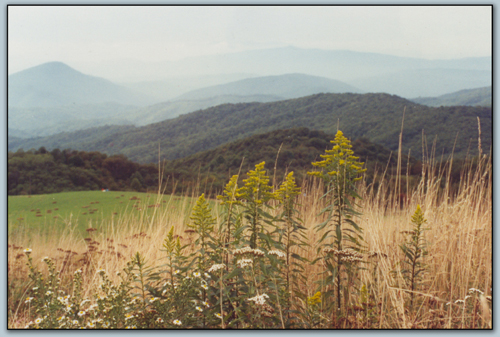
Breathtaking view of the Appalachian
Mountains.
(*photo by Warren Brunner, from book Mountain Moments)
July 16, 2010
Recite Creation's Eighth Day
We sometimes forget that
the forces of nature are at work and that Earth herself is undergoing a process
that did not end aeons ago but rather is still ongoing. Earthquakes and
volcanoes remind us of this continual process. Sometimes people are forgetful
or take risks and thus get in the way of and are hurt in just being too close to
the powerful forces at work. Furthermore, the process can be affected by human
activity and this places an urgent demand on our part to protect our fragile but
powerful planet.
These words are found
among the texts of the recently released book by Warren Brunner (photographs)
and Al Fritsch (texts) entitled Mountain Moments, Acclaim Press, 2010.
See links for purchasing details.
Creation's Eighth Day
Look out!
Grinding rocks, drifting sands,
earthquakes,
seawaves, aftershocked lands,
creeping,
calving blue glacier dies,
icebergs form
at our very eyes,
avalanches of
roaring snow,
upturned
trees in tornado's tow,
muddy debris
on flooded plain,
seashore
pounded by hurricane,
sleet-covered
trees at bough-lost price,
boulders
split by expanding ice,
rivulets on an
eroding Earth --
yes,
ever-yearning, giving birth.

Gladiolus with dew drops.
(*photo by Sally Ramsdell)
July 17, 2010 Accept
Collective Blame: Don't Point Fingers
"God made people who
became sinners; God is to blame"
We do not like this quote
from an unnamed cynic. Something is wrong, for why blame God for what the
free-willed creatures do? Maybe there is something more than discomforting
about pointing fingers whether by atheists, who point them at beings who they do
not believe exist, or by angry believers who appear to be directionless or in a
state of great distress. Let's question the practice of finger pointing. Is
it distracting to say the least? Is it something that betrays
self-righteousness, a bombastic character, or masochistic tendencies (through
inward pointing)? Could it be a way of deflecting blame from the pointing
person?
They are to blame.
This is the safest form of finger pointing and is done by everyone from liberals
to conservatives, Monday- morning quarterbacks to film critics, politicians to
voters. However, although safest it still has the potential power to get
results, for the "they" are almost always outside of earshot and eyesight. The
posturing by pointers is an appeal for support.
You are to blame.
Some find accusing others to be part of their calling, and even derive pleasure,
especially if the "other" is incapable of fighting back. Obviously the one of
whom the finger is pointed finds it uncomfortable. The "you" can define this as
a hot seat or an electric chair but it can be definitive.
I am to blame. In
much the same way, I find it difficult when others point fingers at me and in
their own self-righteous ways want to deflect their own weaknesses by turning
the civic, religious, academic, or community vultures on me. What is my
response, for it is hard to ask others to share that blame?
We are to blame -- if
there is blame to be distributed. Yes, we are part of an imperfect world.
We say this with a wave of a hand with fingers held together. Pointing is
exclusive; waving is inclusive. Accepting a collective guilt is better than
saying you or I or they are guiltless or totally innocent or totally to blame.
Jesus, the sinless one, took on the sins of the world when he suffered and died
for us. Even though blameless he became sin for us. This redemptive act of
saving our world can be achieved by imitating Jesus. The sinless Jesus enters
the fray; so ought we.
We must accept the
collective role of burdening ourselves for that is an act of redemptive love and
mercy. Finger pointing is to distance oneself from others. A waving hand
brings us all together even when we do not deny the wrongdoing. Yes, we must
stop the misdeed from continuing to occur, but it is the "we" and not just a few
who must do this. What we accept is the power of forgiveness for past deeds so
we can work to curb such action.
Prayer: Lord,
help us understand that to point fingers is to deny taking a social
responsibility for the misdeeds done.

Wild grape vine embraces Eastern
redcedar.
(*photo credit)
July 18, 2010
Be Satisfied in Being a Martha
Mary has chosen
the better portion and she shall not be deprived of it. (Luke 10:38-42)
"Marthahood" is seeing
the utter importance of our work to such a degree that we belittle others in
what they are doing. On the other hand, there may be a doubt about the
importance of or envy of the role of another in contrast to our own. The short
story of Martha and Mary inviting Jesus for a meal is one such example of
conflict in roles. It is Martha who extends the hospitality and elsewhere in
Scripture shows herself to be the more forward of the two sisters. Her
hospitality demands planning and attention. However, Mary is also a person who
is doing another hospitable act.
Martha typifies a phase in
our service to and for others. We are hard pressed as was Martha in preparing
for the coming of the Lord and preparing the world for this great event. We
work very hard and expect others to be doing the same things that we are doing.
However, they engage in other callings since their personalities are different.
In some instances they are merely called to celebrate what is already present;
Mary is moved to merely entertain and converse and be present with the guest and
to see that this more contemplative action is enough. Jesus calls it the
greater portion and we must be willing to say that celebration of his presence
without our ongoing healing action is a form of healing. Perhaps for the
activist this is hard to justify.
We need to reduce the
anxiety of reaching our goals with the lock step of others in our community.
Some of them take another and often less-activist approach (offering their daily
actions for the success of others or simply doing studies for future work).
Accepting others and the importance of their work creates an openness on our
part that enhances our own work. However, there are degrees of acceptance. We
may have to point out that their work is ineffective, an excuse for not acting,
or only pretending.
Presence of those with a
higher calling and accepting this is part of a more humble role, and thus a more
realistic approach to our mission. We do not abandon what we are doing in order
to take a more illustrious role. We simply accept our calling to do a service
that is less regarded. The hospitality of a meal is still needed to support the
guest; it is not the thing to do to abandon the backup service, for feeding
another is also important. Accepting the necessity of taking minor roles leads
to the success of the total performance. Marthahood involves growth in
understanding of our mission -- even when others do not regard it as important
or worthy of continued effort. Consistency is seeing the need for the lesser
role, a continual challenge, especially when our activism is misunderstood or
relegated to a minor status.
Prayer: Lord,
teach us to be of service, even when our part is somewhat hidden or forgotten
or taken for granted.

Campanula americana.
(*photo credit)
July 19, 2010
Celebrate Space Week: Tidy-up Outer Space
Space Week is a fitting
time to talk about our "spatial commons." The vastness of the unimaginable
outer reaches of the universe should not fool us, for space is capable of being
junked to a dangerous degree. We already know space hurdles: space exploration
and ventures are costly and require large financial outlays; space observation
is increasingly difficult due to light pollution that affects many urban areas;
many do not have the immediate contact with the darkened sky and twinkling
stars. Now you say that adding to these emerging financial and observational
difficulties is space junk.
Tucson, Arizona, a major
academic observatory site, has taken steps to reduce light pollution through
dimming and curbing street lights; reflection shields direct lighting downward
where the pedestrian and driver can benefit. Some of these urban community
steps for improving the quality of our viewing the heavens could be taken in
other cities as well.
No other commons
challenges us to think in financial terms to avoid unneeded luxury versus
necessities. What about practical aspects of exploration? The useful resources
from other heavenly bodies? The demand for no-gravity conditions for certain
experiments? The dangers of approaching space objects? Space telescopes?
Improvement of our modern communications systems? Orbiting communications
satellites are key to rapid exchange of global information and such business
ventures can be complex and costly. Launching, regulating, fee-collecting,
monitoring and terminating such satellites are global concerns and demand a
"Global Space Agency." Atmospheric scientific research using satellites and
other information sources is quite necessary for the fuller understanding of
climatic changes but could involve billion-dollar bills. Scientific space
probes, telescopes, space laboratories and international space programs are
expensive, and the cost should be borne on a cooperative basis by the wealthier
industrialized nations.
The current space program
has many international cooperative features (e.g., International Space
Station). These global space programs are more than just expensive; they can
be highly risky as well. Serious accidents such as the destruction of the
returning Challenger space shuttle in February, 2003, mean that safety is always
a major consideration -- and calls for more unmanned missions. The 2007
shooting down of a spent space satellite by the Chinese (the U.S. and Russia
have carried out comparable exploits) has resulted in dangerous space junk --
even a paint chip can be dangerous. In 2009 two satellites collided and
showered debris about. "Solar sails" on satellites have been proposed in order
to drop junk into the lower atmosphere where it can burn up. The Economist,
"Sweeping the Skies," April 3, 2010, p. 83.
Prayer: Lord
teach us to praise you in the spatial commons.

Butterfly milkweed, Asclepias tuberosa.
(*photo by Sally Ramsdell)
July 20, 2010
Decide When Numbers Count
Twice in this series of
reflections I have spoken of numbers: what significance these have for other
people in past history (October 25, 2007); and my compulsion that still exists
for counting (November 29, 2006) in the present (daily temperature range,
rowing exercise strokes, or hours working on different issues). Here we take
another stance and look at how numbers in the near or distant future will affect
us individually, locally or at broader national and international levels.
Individually, my
mobility will decrease or come to a halt if hips or knees or back give out.
Weight changes and PSA and other health numbers will limit activity and
mobility. So will the pounds of garden produce harvested this year as well as
the number of books sold for Tobacco Days, Mountain Moments and
Water Sounds. Each of our activities includes projected statistics that will
change future plans and practices.
Locally, we seek
to know the numbers of people who are employed and unemployed and the number of
home foreclosures and housing starts. Local statistics tell us much about the
economic viability of our community or region. Church and civic growth can be
indicated by those coming and going and membership statistics, donations, and
number of cars at church parking lots.
Nationally, the
2010 census being compiled will be used for apportionment of Federal funds
according to total people in a given area. The representation will be
rearranged according to gain or loss of population whether at the national or
state level. Emphasis on policies directed to transportation networks and
renewable energy projects will depend on these population statistics to some
degree. Even the continuation of our Ethnic Atlas Project will be based on the
Census now being counted. However, Dow Jones market
reports are given undue importance in a nation swimming in economics stats.
These reports are meant to support the present order but don't represent most
investors.
Internationally,
much rides on the ability of countries to repay debts. A few months back
Greece was issued a "junk bond" status and Portugal's credit rating was
lowered. We look at data being collected on potential oil reserves and wind
installations, on exports and imports, on expenditures on military hardware and
satellites in space and on changes in GDP. The world's outlook is quantified
and that may be needed in part for environmental policy.
Current and projected
statistics tell something but not the total story, and that is why more in-depth
study is always needed. We can be fooled by limited statistics into making or
overlooking future plans. Yes, stats indicate but are not the full story;
numbers are aggregated and are not flesh and blood. We need more.
Prayer: Lord,
teach us to count properly, compile accurately, and use our numbers to help
save our wounded planet.

Appalachian barn in fog.
(*photo by Sally Ramsdell)
July 21, 2010 Observe
the American Barn: An Endangered Species
Barns are a major
component of the American landscape and they tend to typify the countryside. In
my rural area here in Appalachia, I live a short distance from a dilapidated
barn barely standing though hidden in a grove of woods. I asked the owner why
he allowed it to stand, since wandering children could be endangered if it were
to collapse while they are trespassing. He admitted it was sentimental and that
currently the does and fawns like to winter in it. Such is a final service of
dying farm barns now often replaced by metal sheds or simply torn down. See
"Barns: Environmental Weather Vanes" (November 20, 2006). The condition of
these noble structures is getting more precarious with age.
I spent an estimated
5,000 hours of my lifetime in our barns; those hours consisted mainly by
milking cows and putting in hay, silage, and tobacco, and taking out manure from
wintering cattle. As little kids we spent time playing in the barn as well, for
it was a friendly place -- a description of the major structure is found in
Tobacco Days: A Personal Journey. Like all mid-twentieth century farming
families, we made the barn as much a center of our lives as was our residence.
The last time we painted our major barn red became a family affair. Braver
souls painted the high gables and younger family members painted nearer the
ground. In fact, the barn was part of the "home" much in the sense of the old
rural European house/barn combination -- even though our American barns are
physically at a distance from dwellings.
All too often family farms
are under stress, and barn maintenance is one of the casualties of rural
financial troubles. Regional barns are of distinct
architecture depending on crops grown, climate conditions and ethnic composition
of the given locality. Some were built for hay or grain or livestock or tobacco
or tool storage or combinations of the above. However, farm methods have
changed and barns are being abandoned. Iowa is estimated to be losing one
thousand barns each year and most likely the American agricultural census in
2012 will indicate the fate of many more farm structures. Barns are subject to
loss of value when farms are consolidated; farm numbers decreased from 6.5
million in 1920 to about 2.1 million today.
Can the family farm barn
be saved? Attitudinal change from "new is better" to "reuse the old" is
occurring. New uses include: shops, storerooms, museums, theaters, and even
residences. The National Trust for Historic Preservation has a program
initiated in 1987 entitled "Barn Again!" This is concerned with the heritage of
picturesque barns that are too hard to maintain as family heirlooms. The
program seeks to encourage about 700 barn owners each year in barn maintenance
and reuse for cost-effective purposes; it gives annual awards and steers owners
to tax credits.
Prayer: Help us
Lord, who see our landscape as a beautified creation in which we participate;
encourage us to assist others in preserving historic artifacts that add to that
beauty.

Vibrant color of the Rudbeckia triloba.
(*photo credit)
July 22, 2010
Create
Your Own Autumn Garden
Over the years we strive
for a monthly garden message; in July it is always to plan, prepare for, and
plant the autumn garden. Over time it has become evident that our autumn
gardens evolve in siting, type of veggies, protective covering and spacing (bed
or row style sowing). The autumn planning message itself evolves. Much
depends on seeds available in July; the simple fact is that our seed outlets
generally do not have much demand for the autumn garden for the garden is a
"spring thing." Thus the best answer is to plan far ahead and not just make
obtaining seed a July concern.
A second consideration is
that less summer preservation is needed if the autumn and extended garden proves
productive throughout much of the year. In 2009-10 I harvested every month of
the year (turnips were the winter mainstay). In order to have a twelve-part
salad on December 31st it will take some long-term thinking ahead along with the
timing of seed sowing and planting. We need favorites that survive cold
weather, often with a little added protection of Reemay, temporary
plastic cold frame, greenhouse, sun room or leaves.
I intend to sow: kale,
mustard, dandelions, collards (hardy throughout winter), spinach, arugula,
endive, Swiss chard, turnips, radishes, broccoli, kohlrabi, and Brussels
sprouts, with a dash of parsley from indoors. Add to this carrots that can stay
in the ground for many extra months; the same can be said for well-hilled
celery. One can have some autumn peas but forget autumn beans, tomatoes, squash
or peppers; dry, store, freeze and perhaps can the surplus from the summer
produce along with many herbs including dill -- the herb of the year. You may
provide for fresh fall onions and garlic as well.
Placement of the vegetable
varieties is utterly important, since severe weather will dry out and freeze the
crop. With the effects of climate change beginning to be noticed, one may need
to water more, and so plan more row rather than area sowing of seed -- rows take
less water. Some veggies can be protected by others. For instance, the
broccoli or collards can be planted so that the foliage can protect spinach and
arugula. Look up cold weather veggies and add some not mentioned that may prove
your local champions.
The flower lovers among
us who interplant the colorful delights of spring through frost may have a
harder time; I am not experienced enough to make helpful suggestions. Flowers
are a real challenge for the year-round gardener. Keep us posted on
cold-weather flower suggestions, that is more than mums and surviving
marigolds. Whatever your creative skills, now is truly the time to think ahead
-- for time flies for those having fun gardening.
Prayer: Lord, help
us to think ahead; and, if we are successfully challenged in little matters such
as autumn gardening, we may be able to tackle the bigger ones such as Earth
herself.
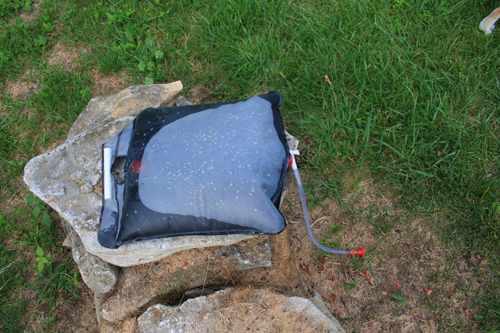
Portable solar camp shower.
(*photo credit)
July 23, 2010
Promote Solar Hot Water Systems
July is a solar month and
a time to recall that no application has greater versatility and economy than
solar hot water systems. Photos of the 1904 San Francisco Earthquake show
damaged house roofs equipped with these solar water devices a hundred years
ago.
About one-tenth of an
average household's energy budget is expended on heating water for showers and
kitchen uses. The cheapest way to heat domestic water is by the sun, and this
is the most cost-effective solar application outside of growing produce on the
land using the sun's rays. Some solar water heating systems are "active"
varieties (heating with the sun an enclosed liquid which transfers heat to
adjacent water pipes). These active systems are more expensive, but more
efficient and improving with time. Homemade "passive" systems (which heat the
water directly in black glass-lined metal tanks enclosed in insulated boxes) are
also to be recommended. The latter have no pumps or extra gadgets except a
pressure release valve.
Solar heaters need to be
of a size adequate for your water needs. Much depends on the amount of water
used, but conservation should always accompany solar energy use. Shower lengths
and volumes are critical. With this in mind, install water-conserving
showerheads and initiate a practice of "army" style showers (wet down, soap up
without water running, and rinse off). The heater design should be visibly
pleasing and in harmony with the exterior of your building. The site should be
near where water is used, and yet accessible to those who wish to inspect the
unit closely. The ideal situation in areas of severe winters is to have a
non-solar back-up system that is also energy-efficient and of low environmental
impact. Instant heating back-up systems work well enough, if the domestic water
demand is low and the water pressure sufficient to allow the water flow to move
with suitable force.
Many prefer to save money
and do their own construction. A homemade solar water heater is quite simple to
construct and can be built by enclosing a used water tank hooked to a
gravity-fed water system. Water is collected in a solar absorbing water tank
that is painted black. The enclosure resembles a glass-covered open-sided
snug-fitting insulated coffin (made with weather-protected wood). Six-inch
Fiberglas insulation batts are covered with aluminum flashing to preserve
the solar-heated water for use after dark.
Homemade solar hot water
heaters may be mounted at selected locations and angled toward the sun.
Slightly southeast directions are sometimes found to be adequate. An insulated
door placed over the opening in the glass can be inserted to close at night, but
it may prove inconvenient to close and open in order to retain the heated water
longer. If properly insulated in an average year, the solar heaters will
furnish 100 degree F water for about two-thirds of the year. However,
non-protected devices should be drained in winter and used only in warmer
periods.
Prayer: Lord,
teach us to use the sun's rays to our benefit.

Shafts of sunlight reach tall understory
wildflowers.
(*photo credit)
July 24, 2010
Share with the Hungry and Forsaken
O Lord, teach us to say
sincerely:
"Give us this day our
daily bread."
You have allowed us to
call you Father,
and to see all the
human family as brothers and sisters.
So the "us" means all of
us here on Earth:
the consumers of
prime beef and junk food;
those who resort to
pet food and accept it;
those in Bihar and
Ethiopia and Paris and Washington.
You tell us to give
also.
You tell us that when
we sow bountifully,
so shall we
reap.
You say that when we
harvest and overlook a sheaf
not to go back,
for that is for the
alien, the orphan, the widow.
You say that when we
knock down the fruit from the olive
not to go over the
branches a second time;
the same applies
when we pick grapes.
-- for we were once
slaves to allurements. --
You have given us daily
bread,
and we, who have
eaten our fill,
tend to be unmindful
of others.
We are insensitive to
the cries of the poor,
and we turn our eyes
from the famished,
for they are not
pleasant to behold.
You who fill the lowly
with good things,
assist them in
communicating with us,
and let us seek to
become lowly in return.
Help us to see and be
moved,
to demand justice
that all receive their due,
and that justice
includes our sharing deeds.
Help us to share our
daily bread with all
in justice and not
charity,
for our bread
belongs to all.
We are spiritually hungry
and blinded,
for we know how to
take
but lack knowing how
to give and share.
We make our prayer
through Christ our Lord. Amen
(September 24, 1974)

Fruiting bodies of moss adorn a tree branch in the deep summer forest.
(*photo credit)
July 25, 2010
Recite a Green "Our Father"
The "Our Father" is a
prayer that is more than one said to MY Father. God is father to all people,
our global brothers and sisters; our Father is creator of all things in the
universe -- and thus father to all creation. More popular individualized
spiritualities allow many of us to minimize OUR community needs and concerns;
however, healing our wounded Earth is a community enterprise. I cannot change
the world alone. We can.
Our Father, who art in
heaven -- takes into consideration the God who directs and guides our
family, who created this vast universe and who is a loving God who wants us to
help usher in the kingdom of peace and justice.
Hallowed be thy name
-- The holy name is given not only in and among people, but also among all the
plants and animals of creation. Acknowledging what is already holy is our
prayer.
Thy Kingdom come --
The New Heavens and the New Earth are connected, and are already beginning to
appear in a glory to be revealed. We are called to halt Earth's deterioration,
to help heal the wounded, and to hasten the coming of God's kingdom.
Thy will be done --
The coming of the will of God expressed in the Scriptures will include a human
component that strives for sharing resources and enhancing a proper quality of
life for all.
Give us our daily bread
-- So many of the world (current estimates at over one billion) are without
resources to meet the needs for the day. Can we worthily receive communion, if
so many are without the necessities of life? Can we solve ecological problems
without addressing all social justice issues?
Forgive us our debts
-- We need to ask forgiveness for the debts we have incurred due to our use of
world resources. This becomes an awesome moment, for we come to terms with
ourselves and our ability to forgive. We discover that here is the grace of
forgiveness that awaits our individual and collective acknowledgment and that we
must reexamine our consumer patterns.
Lead us not into
temptation -- Most of us are tempted by the addictive consumer products all
around us. We are tempted to take the easy way and become wanton consumers in
this world of scarcity -- and the culture offends our collective sense of
togetherness by making us think and act selfishly and forget to share with all.
But deliver us from evil
-- The deterioration of Earth is the result of the greedy in power -- the
personification of pervasive evil in the world around us. We need God's help at
this time to be free, to halt the destruction of the environment and to
encourage all people. We must be able to confront and overcome the evil in our
midst and to do so by an agenda of doing good.

Black-eyed susans in late July garden.
(*photo credit)
July 26, 2010
Learn Spanish?
Buenas Dias! A
variation on this theme was written six years ago when in the flush of more
youthful hope I set a goal of conversing in Spanish. Granted a two-week morning
course was not sufficient, and neither at the end were a few unused phrases,
since I do not live near those who speak Spanish. One who had courses in Latin
should find Spanish a piece of cake. However, we monolinguists do not find any
language easy, especially when we get older. Those who are willing to play
Spanish records over and over should be able to succeed. Some of us do not find
time.
A good national
resolution ought to be that everyone in grade school should learn Spanish since,
with the influx of Mexicans and others from Latin America, it has de facto
become our second U.S. language. We find the dual English/Spanish language on
road and hospital directions, in governmental buildings, on census forms and in
airports. Church pamphlets and commercial instructions are in both. More and
more citizens agree that bilingualism has many benefits for our culture, our
minds and our international relations -- but must we apply this to us in the
older generations? While champions of requiring more subject materials for the
younger folks, we elders do call for exemptions.
Is this exemption
approach proper? I have never proposed such in any of the other 1668 Daily
Reflections on the Internet. Do I personally fit into an exception being
dyslexic -- and finding even reading English a past hurdle in youth. I would
rather say Manana to initiating the burdensome process of learning
Spanish. I get my major homilies translated into Spanish for the prison work
but must admit that knowing only English is a handicap for the time left in this
ministry. The local, much younger pastor to the two federal prisons I minister,
is getting his nerve up to the point where he is taking off a few weeks to learn
more Spanish this summer. Thank heaven!
Again, this phenomenon of
emerging Hispanic presence is for our betterment in America. These
hard-working, family-loving people are the bedrock of many communities. In
theory, hospitality means that we are to learn basic Spanish so as to improve
commerce and civic interaction. Multilingual skills are valuable. We as a
nation are being shaken from our monolingualism and starting to join the rest of
the world. Should we not help those of other tongues learn English by speaking
in a basic set of words (Globish), rather than in a language using various words
with the same meaning? English pronunciation and spelling hurdles are hard
enough. My resolution remains: when time and energy permit I WILL learn Spanish
-- manana. Many of those we serve are poor migrants, work hard, send
money back to families, and need support and counseling in their lives while
they are here. Yes, it would help to speak more directly with them.
Prayer: Lord
teach me to use every skill for better communication with my Hispanic
brothers and sisters.

Butterfly nestles amid lush summer
vegetation.
(*photo credit)
July 27, 2010 Repair
Lead-Painted Houses with Caution
Those of us, including
this author, who live in old homes with previous coatings of lead-based paint
have got to be cautious. The lead paint is most likely simply coated over, and
any repair may allow it to be loosened. Over and over, cautions are given for
such residences in which infants are present -- and the warnings are most needed
since infants put just about anything into their mouths including paint chips.
The U.S. Department of Housing and Urban Development (USHUD) has a pamphlet
saying, "Caution: Lead Paint Handle with Care." The handling goes beyond the
infant and includes all of us.
We who believe in
recycling like to make valuable older buildings more comfortable. We cut,
attach, detach and rearrange both interiors and exteriors at various times
either through do-it-yourself projects or by use of outside contractors or
volunteers. The cautions below are meant for do-it-yourselfers along with
parents of infants.
* Use the right tools:
Use vacuum cleaners
and power tools with high efficiency particulate air (HEPA) filters;
If
you use a power sander or grinder, be sure it has a HEPA
filter as well as a hood to trap
dust;
Never power-wash or
sandblast painted surfaces;
Never use tools that
create dust chips, high heat or fumes;
Never use open
flame torches or heat guns at temperatures above 1100 degree F; and
Never use paint
strippers that contain methylene chloride.
* Work safely and clean
up lead dust:
Fix water damage
that can make paint peel;
Wet down the paint
before you sand or scrape to control lead dust;
Use heavy plastic
bags to remove dust and trash; and
After the job, wash floors and other
surfaces with soap and water and rinse with fresh water.
Many old homes were
constructed using good workmanship and materials and deserve to be known as
heritage places. But we must remember that higher quality paints of a half
century or more ago contained lead bases, and the painted surfaces remain in so
many places. When left unattended, these will weather and peel; when removed
the result is often an even greater risk to safety. Federal law requires
contractors to provide a brochure, "Protect Your Family from Lead in Your Home,"
to owners and occupants before starting jobs that involve lead paint. Call the
National Lead Information Center ( 1-800-424-5323) for free copies.
Prayer: Lord
teach us to be cautious in all matters and to see our good intentions matched
with awareness of dangers.
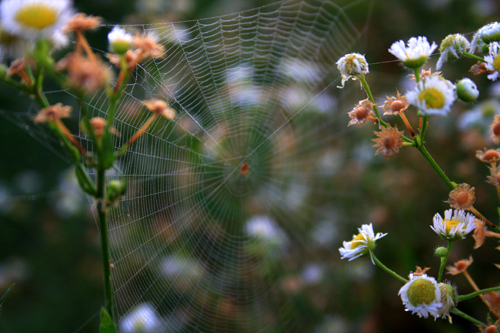
Spider depends upon the flowers of
Philadelphia fleabane, Erigeron philadelphicus, for support.
(*photo credit)
July 28, 2010
Proclaim a Floral Ode to Joy?
Go out to the whole
world; proclaim the Good News to all creation. (Mark 16:16)
We sing while we work, and
there is no better place to sing than among growing plants, which join in silent
but joyful ways to show gratitude for being alive. Our song announces that the
Good News goes out to all creation. When we sing, we add melodious words to our
emotional feelings; we gladden our immediate environment; we allow the
vibrations of joy to extend to others in the vicinity and to more distant living
beings. Joy is contagious and thus we, as messengers, are a source of Good News
to all.
For the contagion to work
successfully we need to go out. Sure, sing to houseplants but that is within
the confines of a building. Unfortunately barriers exist dividing inside from
outside. To go out to all the world means we must exit buildings and enter
gardens, the "launching pad" of Good News to all of creation. The lowly garden
of creation (Eden), and the re-creation (the garden of Joseph of Arimathaea)
from which Jesus rose, were the sources of news of sorrow and news of joy.
Gardens have a special place for they are made for human benefit and by human
hands.
Vibrations of joy
extending in creation become Good News, for if these beings bring us joy, we, in
turn, extend that joy outward to all around us. This ripple effect of Good News
allows for the receptivity of a sense of thanksgiving among those who can
articulate the feelings in the heart. All creation basks in the joy of a
thankful soul. In this manner, while sin abounds and does harm, joyful
thanksgiving has the opposite effect of building up the crescendo of joy.
Prayer: O God,
fill our eyes and hearts with the beauty that flowers give when intertwined with
growing produce. Let the sheer delight of colorful, fragrant and tasty plants
uplift us high above the everyday world, scarred by human-made ugliness and
uniformity. Although we cannot repair all wounds, we can still beautify a small
part of our surroundings. Give us insight into what this scarred planet can
become. Let today's local delights be wordless praise to you and inspire us to
raise collective voices to you in an ever-swelling chorus. Touch and cultivate
the gardens of our hearts, filling them with grandeur, and allowing them to grow
in the love that is within each. Let our garden work and song be the
foreshadowing of eternal delight. Joyfully, joyfully, we extol you!
Let the heavens be
glad, let earth rejoice,
let the sea thunder
and all that it holds,
let the fields exult
and all that is in them,
let all the woodland
trees cry out for joy.
(Psalm 96:11-12

Bee on flower of St. John's wort.
(*photo by Sally Ramsdell)
July 29, 2010 Expose the
Limited "Creation-Centered Spirituality"
These days
creation-centered spirituality is quite popular among the spiritually-inclined.
While the movement bears some enticing elements such as love for nature and all
creation, still it is not complete, and can lead to neglect of the redemptive
aspects of earthhealing so often emphasized in these Daily Reflections.
I have been somewhat restrained (not in style with my confrontational
personality); I do not name names, for my loyalty to personal friends who are
creation-centered is still operative. This circumspection has caused confusion
on the part of others. I hold a resurrection-centered spirituality containing a
strong redemptive element that must be championed and not ignored.
I do not critique
creation-centeredness as such, for I affirm some principles; a creation
reflection initiates the Ignatian Spiritual Exercises and is needed
today. However, the approach has severe limits that are answered in a broader
spirituality.
* A false humility
as though we are so much a part of the whole chain of being that we lack special
characteristics as free beings with immortal souls. Rather I approach this from
the Virgin Mary's perspective, for we are humbled by what God calls us to be,
namely, like Christ, servants of all. In our case we serve the flora and fauna
as well as people. We must never lord over or oppress creatures; we are
their brothers and sisters and must treat them with respect.
* An excessive
speculative spirituality must be tempered and balanced with a serving one
that sees some creatures as worth saving through confrontational and direct
practical work -- thus a need to wash feet and clean up the environment. Saving
our wounded Earth is part of the historic reality of Holy Week, namely that
Jesus serves us all by taking on our imperfections, suffering, dying and rising
for us.
* A bland interfaith
spirituality that de-emphasizes the role of the Christian redemptive
perspective. Is creation-centered spirituality popular, because it does not
require a priestly (male-oriented) role of presider over the Eucharist? Is this
found in the "Cosmic Christ" or Cosmic Eucharist? Does this "cosmic" insight do
away with a consecrated priesthood that has apostolic succession and is at the
heart of the Eucharistic celebration and the rendering of Calvary present in
space and time? An authentic Cosmic Christ must include the real flesh and
blood, for our work is too difficult to undertake without the nourishment of
Divine Food. If you are unfamiliar with these differences, see Spirituality
through the Seasons on this website.
* A passive
creation-centered approach de-emphasizes the radical need to change our
world order. It acts as a palliative for the pained, rather than an energizing
spirituality of action.
Prayer: St.
Martha, on this your feast, ask the Lord to help us understand our humble role
as healers of our wounded Earth.
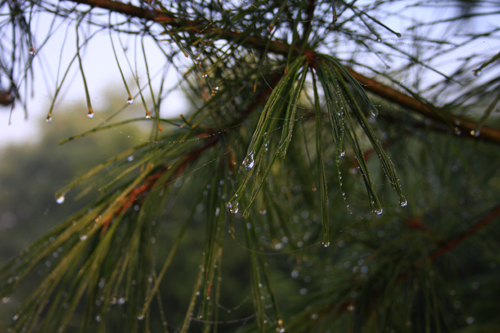
Droplets of morning dew on Eastern white
pine, Pinus strobus.
(*photo credit)
July 30, 2010
Consider Ignatian Principles and the Environment
The challenge is present for
one who is a Jesuit and who is Ignatian in spirituality (Ignatius' feastday is
tomorrow); we seek to discover the distinctive elements in Ignatian spirituality
as it applies to healing our wounded Earth. St. Francis has a grand ecological
outlook; St. Benedict has a sustainable community model; the Ignatian
contribution applies to the individual and to the community working as a service
team for saving our wounded planet -- and that puts it into personal reflection
on one's way of acting. There are at least five aspects to this healing
service:
1. Discerning the
good and bad movements is alluded to by many in the environmental movement but
not in a prayerful and systematic manner. Ignatius' contribution of
distinguishing the movements of the spirit is needed today because the
motivation of many healers is imperfect. They seek, albeit limited but
unsustainable, material profits and thus damage Earth while trying to preserve
her. In counterdistinction we ought to develop a process, and Earth Healing
will offer this as a new blogging site, "Gray Matter in the Green," a
first for this website.
2. Thanking God
for the gifts of Earth herself is part of Ignatius' "Greater Glory of God."
Our Special Issues tries to address this need for extending blessings and thanks
throughout all creation, A Ministry of Gratitude: One Thousand Things to Be
Thankful for. We are all called to be thankful and to help create a renewed
environment with this attitude in mind. Seeing all as divine gift allows us to
extend our perspective to many works that we would normally overlook and bless
those who have been called to work in these fields.
3. Focusing on the
major issues means following the "Principle and Foundation" that Ignatius laid
down at the beginning of the Spiritual Exercises. A good treatment of
this theme is a recent book by fellow Jesuits Joe Bracken and Bob Sears --
Self-Emptying Love in a Global Context: The Spiritual Exercise and the
Environment, published by Cascade Books (2006).
4. Reflecting on
the "Three Degrees of Humility" (see Daily Reflections, May 10-12,
2010). The calling to each of us is to ever deeper involvement with
kindred-spirits and that means the poor. We experience degrees of this
involvement and find in the Spiritual Exercises a pattern that is called
for among earth-healers, namely being for the poor, being with the poor and
finally opting for being poor.
5. Taking action
is the ultimate Ignatian spiritual thrust and this involves actual service for
those who are in need whether the unlearned or the refugee. We must work for
the betterment of all.
Prayer: Through
the intercession of St. Ignatius of Loyola may we ever be refining our
earthhealing service for the sake of our wounded Earth.

Busy ants transport precious cargo.
(*photo credit)
July 31, 2010 Launch a "Gray Matter in the Green" Conversation
Tomorrow we had planned to launch a blog site that would have
questioned the current global economic and political system. We
wanted to begin this interactive service on our website. However,
we have had some second thoughts, for "blogging" would not be an
adequate manner of handling some difficult and haunting questions
before us. Thus we are in the process of inviting a period of
further comments to see whether another Internet interactive venue
would be better suited for the task at hand. Our hope has been that
using the Internet could avoid physical conferencing via air travel
with its heavy carbon footprint, or the distractingly simplistic
approach of pop experts giving comforting environmental talks that
skirt the major issues. Instead, we seek more input on the
following basic issues and questions:
1.
Basic Justice Issue: Must nations implement regulation to
prevent destruction of our fragile planet through self-serving
consumption of Earth's resources by the world of "haves" (with many
luxury wants) taking what, in justice, must be shared with
the "have-nots" (with essential needs such as food and
housing)?
Note
-- Between 1900 and 2005 over one billion people (mainly Asians)
joined about 800 million in the consuming middle class in the West.
During the same period the number of the world's hungry, which
through UN millennial goals was supposed to be halved by 2010,
increased from 850 million to over one billion. Progress? In the
same period the number of the world's billionaires went from dozens
to well over one thousand. The 14 trillion dollars now in global
tax havens could give every person on this planet a decent house,
waste system and domestic renewable energy. Do not the resources
belong to all, especially the needy?
2.
Basic Spiritual Issue:
Why not follow the Ignatian principle of the Third Degree of
Humility? Why not share with the poor, and thus become enriched by
spiritual (not material) profit motivation? Are we willing to
abandon the hidden materialistic values so often found in our
educational philosophy? Can we not limit individual wealth? How
about workers owning the work place?
3.
Basic Economic Issue:
Are we willing to reclaim the commons for ALL people, and to do so
through viable global regulations and fair taxation of the
super-rich?
4.
Basic Emotional Issue: Why aren't we righteously angry?
Is it because our capitalistic funders won't allow us to be?
5.
Basic Environmental Issue: Can we be concerned
environmentalists without questioning the capitalistic system?
Prayer: Lord, help
us to sponsor interactive conversation that involves discerning the
possibility of a world order that will address current global
justice and related issues.